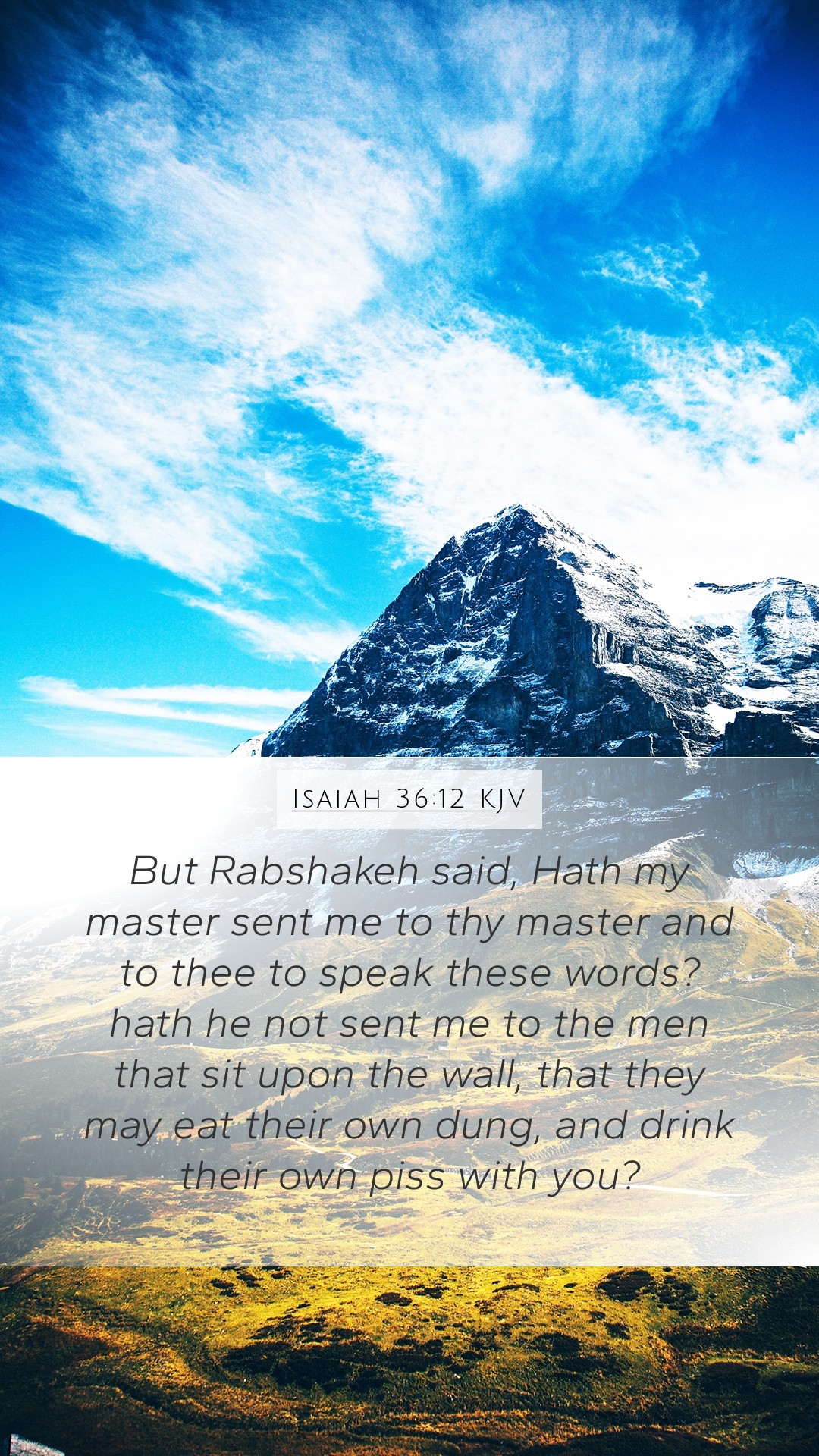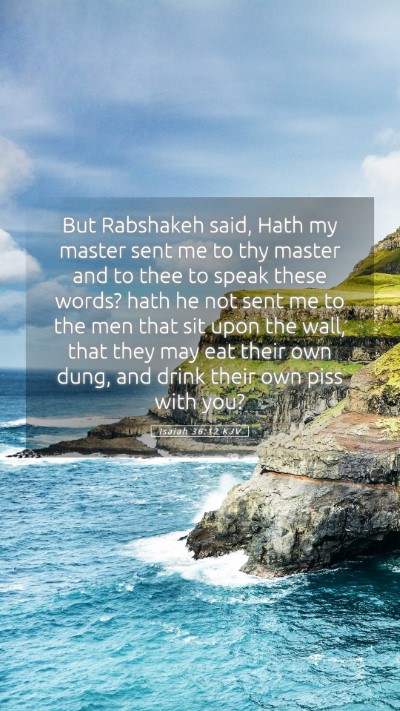Bible Verse Explanation: Isaiah 36:12
Verse: Isaiah 36:12
“But Rabshakeh said, ‘Has my master sent me to your master and to you to speak these words, and not to the men who sit on the wall, who are doomed to eat their own dung and drink their own urine with you?’” (ESV)
Introduction
Isaiah 36:12 is a powerful verse that illustrates the conflict between the Assyrian empire, represented by Rabshakeh, and the people of Jerusalem. This moment is pivotal in the narrative of Isaiah, showcasing both the intimidation tactics employed by the Assyrians and the desperate situation faced by the besieged inhabitants of Jerusalem. Below, this verse is unpacked with insights from renowned public domain commentaries such as those by Matthew Henry, Albert Barnes, and Adam Clarke, providing a comprehensive understanding of its meaning and significance.
Contextual Background
The historical context of Isaiah 36:12 is essential for its interpretation. Assyria, under King Sennacherib, attempted to conquer Jerusalem around 701 BC. Rabshakeh, an Assyrian official, delivers a message filled with arrogance and mockery, aimed at dismantling the morale of the people of Jerusalem. The dire situation is emphasized through vivid imagery – a rhetorical tool that underscores the hopelessness of their position.
Analysis of Key Themes
- Threat and Intimidation:
Rabshakeh's speech serves as a psychological tactic aimed at instilling fear in the hearts of the Jews. Henry explains that this tactic was common in ancient warfare, where the enemy would seek to demoralize before a physical confrontation.
- Desperation and Degeneration:
The reference to the people’s plight is stark. As Barnes notes, being forced to eat "their own dung and drink their own urine" was emblematic of a society under siege, stripped of dignity, and at the brink of despair.
- Divine Sovereignty vs. Human Power:
The Assyrians believed themselves invincible, which Clarke points out, is a common misunderstanding that human power can defy God's will. This reinforces the larger theme of the book of Isaiah, that God is sovereign over all nations.
Commentary Insights
Matthew Henry: This commentary emphasizes that the threatening words of Rabshakeh were calculated to incite fear and doubt regarding God's protection over Jerusalem. Henry sees this as a reminder of the power of words and their impact on faith.
Albert Barnes: Barnes highlights the humiliation implied in Rabshakeh's message. It reflects a profound psychological warfare tactic, using vivid imagery to create a sense of hopelessness among the besieged. He also points to the broader implications of this encounter, illustrating the struggle between faith and fear.
Adam Clarke: Clarke observes the cultural significance of Rabshakeh's taunts, drawing on the brutality and desperation inherent in siege warfare. He notes the universal human tendency to resort to degradation when hope is lost and how Rabshakeh's commentary exemplifies the large-scale suffering caused by war.
Biblical Themes and Applications
In considering Isaiah 36:12, several key themes emerge that are applicable to modern readers:
- Faith in Adversity:
Even in moments of extreme testing, what is required is an unwavering faith. This theme speaks to a common struggle -- how to maintain hope when faced with seemingly insurmountable challenges.
- Rhetoric of Fear:
The focus on Rabshakeh's words exemplifies how fear can be manipulated for control. Christians are reminded to hold onto the truth of God’s promises in the face of intimidating circumstances.
- The Nature of Power:
The narrative also prompts a reflection on the true sources of power, suggesting that worldly might is no match for divine authority. This recognition can shape one’s understanding of current geopolitical realities.
Cross References
This verse can be related to the following Biblical passages that explore similar themes:
- 2 Kings 18:27 – The same incident is recounted, emphasizing the lengths to which Rabshakeh goes to instill fear.
- Isaiah 37:6-7 – God’s promised deliverance following this confrontation. Here, the divine response plays a crucial role in redirecting the despair of the people.
- Psalms 22:14-15 – Another citation of deep human despair resonating with the imagery found in Isaiah 36:12.
Conclusion
Isaiah 36:12 brings forth a moment rich with tension and theological depth. Understanding the words spoken by Rabshakeh requires insight into the human condition, the nature of fear, and the power of divine sovereignty. As we study this verse in our Bible study groups or through online Bible study, let us glean from its profound lessons about faith, resilience, and the true source of our strength.
For anyone seeking to delve into Bible verse meanings, Bible verse interpretations, and understanding Scripture, this verse serves as a meaningful study topic, rich in insights and applicable lessons for daily life comprehending the historical context of Bible verses.


